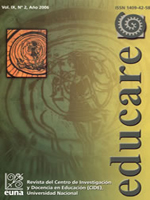Gramsci y el proceso hegemónico educativo
DOI:
https://doi.org/10.15359/ree.9-2.1Abstract
Hermeneutic approach to one of Antonio Gramsci’s central thoughts: the construction of the hegemonic educational process. The essay points out that Gramsci’s thought is still valid for modern times, and in order to analyze the contributions of his thoughts to education as hegemony, the author explores the interrelationship between the concept of civil society and its dialectic interaction with the State (political society). Likewise, the complex, powerful and subtle forms adopted by the cultural and political hegemony fostered by the ruling class, are analyzed to consolidate an ideological consensus around its hegemonic project.
The third section explores some dimensions related to the State’s direct involvement in education, from the point of view of the processes that account for the historical link between the political and the educational elements. In order to explain the process, we resume Gramsci’s proposal in relation to the hegemony that is established in the civil society under the construction of a socio-cultural unity and analyse the concept of organic intellectual and its role in conforming social hegemony.
Fourth, we include an analysis of the historical link State-Education from the point of view of organic articulation between the structural basis and the ideological superstructure and, therefore, from the construction of an ideological system. Finally, there is an approximation to Gramsci’s vision on the education-hegemony link, pinpointing its meaning and actuality for the analysis of the role played by educational politics as a hegemonic process in civil society.
References
AP (1985). La alternativa pedagógica. Barcelona, Hogar del Libro.
Belligni, S. (1982). "Hegemonía". En Bobbio, N. y Matteuci, N. Diccionario de política. Madrid, Siglo Veintiuno.
Bobbio, N. (1980). Gramsci y la concepción de la sociedad civil. Barcelona, Avance.
Bobbio, N. (1982). "Sociedad civil". En Bobbio, N. y Matteuci, N. Diccionario de política. Madrid, Siglo Veintiuno.
Broccoli, A. (1977). Antonio Gramsci y la educación como hegemonía. México, Editorial Nueva Imagen.
Dubiel, H. ( 1993). ¿ Qué es neoconservadurismo? Barcelona, Editorial Anthropos.
Eagleton, T. (1997). Ideología. Una introducción. Barcelona, Paidós.
Eccleshall, R. (1993). "Conservadurismo". En VV.AA. Ideologías políticas. Madrid, Tecnos.
Femia, J.W. (1987). Gramsci's política/ thought: hegemony, consciousness and revolutionary process. Oxford, Claredom Press.
Femández, F. (2001). Leyendo a Gramsci. España, El Viejo Topo.
García, E. (1991). "Reforma escolar, acumulación, legitimación y Estado del bienestar". En VV.AA. Sociedad, cultura y educación. Madrid, CIDE-Universidad Complutense de Madrid.
Habermas, J. (1999). Problemas de legitimación en el capitalismo tardío. Madrid,
Ediciones Cátedra.
IO ( 1975). Los intelectuales y la organización de la cultura. México, Juan Pablos
Editor.
Macciocchi, M.A. (1980). Gramsci y la revolución de Occidente. México, Siglo Veintiuno.
Manacorda, M.A. ( 1987). Historia de la Educación 2. Del 1500 a nuestros días. México, Siglo Veintiuno.
Matteuci, N. (1982). "Liberalismo". En Bobbio, N. y Matteuci, N. Diccionario de política. Madrid, Siglo Veintiuno.
Miranda, G. (2004). "Capitalismo global y cambio educativo. Los fundamentos estructurales e ideológicos de la política educativa neoliberal". En Revista EDUCARE, Vol. 6. No. 1, 13-42. Universidad Nacional, Heredia. Costa Rica.
MS (1975). El materialismo histórico y la filosofía de B. Croce. México, Juan Pablos Editor.
PP (1975). Pasado y presente. México, Juan Pablos Editor.
Downloads
Published
How to Cite
Issue
Section
License
1. In case the submitted paper is accepted for publication, the author(s) FREELY, COSTLESS, EXCLUSIVELY AND FOR AN INDEFINITE TERM transfer copyrights and patrimonial rights to Universidad Nacional (UNA, Costa Rica). For more details check the Originality Statement and Copyright Transfer Agreement
2. REUTILIZATION RIGHTS: UNA authorizes authors to use, for any purpose (among them selfarchiving or autoarchiving) and to publish in the Internet in any electronic site, the paper´'s final version, both approved and published (post print), as long as it is done with a non commercial purpose, does not generate derivates without previous consentment and recognizes both publisher's name and authorship.
3. The submission and possible publication of the paper in the Educare Electronic Journal is ruled by the Journal’s editorial policies, the institutional rules of Universidad Nacional and the laws of the Republic of Costa Rica. Additionally, any possible difference of opinion or future dispute shall be settled in accordance with the mechanisms of Alternative Dispute Resolution and the Costa Rican Jurisdiction.
4. In all cases, it is understood that the opinions issued are those of the authors and do not necessarily reflect the position and opinion of Educare, CIDE or Universidad Nacional, Costa Rica. It is also understood that, in the exercise of academic freedom, the authors have carried out a rogorous scientific-academic process of research, reflection and argumentation thar lays within the thematic scope of interest of the Journal.
5. The papers published by Educare Electronic Journal use a Creative Commons License:














 The articles published by Educare Electronic Journal can be shared with a Creative Commons License:
The articles published by Educare Electronic Journal can be shared with a Creative Commons License: 



